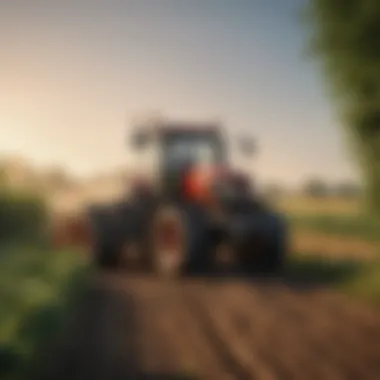Cropin Technology Solutions: Transforming Agriculture


Intro
In recent years, agriculture has undergone significant transformation driven by technology. Farmers are now faced with new challenges, including climate change, dwindling resources, and changing consumer expectations. In this context, innovation plays a crucial role. Cropin Technology Solutions emerges as a key player, offering a suite of tools designed to modernize agricultural practices. With a focus on enhancing productivity and sustainability, Cropin is at the forefront of the agricultural tech revolution.
Current Trends in Agriculture and Horticulture
Overview of Recent Innovations
The agricultural landscape is witnessing a rapid shift. Technologies such as precision farming, automated machinery, and data analytics are becoming more common. These advancements allow for better resource management and informed decision-making. Cropin utilizes various innovations including satellite imaging and AI-driven data analysis. This integration helps farmers tailor their practices for optimal yield and sustainability.
Sustainable Practices Gaining Popularity
Sustainability is no longer a mere buzzword. Farmers are increasingly adopting eco-friendly practices. Cropin’s solutions specifically support these trends by enabling better tracking of crop health and resource usage. Practices such as crop rotation, integrated pest management, and organic farming are supported through data collected and analyzed by Cropin’s technology. This approach aligns agricultural output with environmental health.
Essential Farming Techniques
Soil Health Management
Maintaining soil health is critical for crop productivity. Cropin provides tools that help monitor soil conditions in real-time. This monitoring allows farmers to apply nutrients effectively and improve soil structure. By promoting practices like cover cropping and reduced tillage, the platform helps sustain soil vitality.
Pest and Disease Control Strategies
Managing pests and diseases is vital for ensuring successful harvests. Cropin’s technology includes predictive analytics that alert farmers about potential threats. Using this data, farmers can take preemptive actions to minimize crop loss. Combined with integrated pest management techniques, these strategies enhance food security while being economically viable.
Tools and Technology in Farming
Overview of Advanced Farming Tools
Cropin harnesses a range of advanced farming tools tailored for today’s agricultural needs. Their platform offers insights into the entire farming process, from sowing to harvest. Tools include crop monitoring systems, weather forecasting applications, and market linkage solutions. Such tools provide a comprehensive approach to farming, reducing risk and enhancing productivity.
Case Studies on the Use of Technology
Numerous success stories illustrate the impact of Cropin's technology on agriculture. For instance, farmers in India have reported improved yields by leveraging Cropin's insights for crop management. They utilize data to make informed decisions, which results in water conservation and better pest control. This success resonates with the goals of modern agriculture, showcasing a path forward for farmers everywhere.
"Technology is not just an add-on; it’s a necessity for modern farming to thrive in today’s world."
Through the integration of Cropin’s solutions, the industry is witnessing a shift that not only improves productivity but also paves the way for sustainable practices. This is just the beginning of a larger transformation in agriculture.
Prelude to Cropin Technology Solutions
In the contemporary agricultural landscape, the incorporation of technology is paramount. Cropin Technology Solutions stands at the forefront, providing innovative solutions that reshape how farming operates. This guide delves into the essential elements that Cropin introduces, illustrating its significance in enhancing productivity, sustainability, and decision-making in agriculture.
The Role of Technology in Agriculture
Technology's role in agriculture is multifaceted. It ranges from data collection to analytics, ultimately pointing to smarter practices and increased yield. Modern farmers face various challenges, such as unpredictable weather patterns, market volatility, and the need for resource management. To navigate these issues, technology emerges as a crucial ally.
Use of digital tools enables farmers to access real-time data about their fields, manage resources more efficiently, and reduce waste. Some main applications include:
- Precision agriculture: This involves using satellite imagery and sensors to monitor crop health and soil conditions.
- Data analytics: Analyzing agricultural data can inform decisions that lead to better yields and lower costs.
Thus, Cropin's technology is not just about tools; it serves as a bridge to sustainable and efficient farming practices.
Overview of Cropin as a Company
Cropin Technology Solutions is a pioneering entity focused on driving agricultural transformation through technology. Founded with the goal of improving farming practices, it offers a suite of products tailored to meet diverse agricultural needs. They develop cutting-edge software that employs cloud-based solutions, providing users with insights that empower them to make informed decisions.


The company emphasizes innovation in its approach, focusing on integrating data intelligence into farming. As it partners with stakeholders across the agricultural value chain, Cropin ensures that technology reaches those who can benefit the most, from smallholder farmers to large agribusinesses. The company not only aims to improve yields but also to enhance the overall efficiency of agricultural practices across regions, making it a crucial player in modern farming.
Key Features of Cropin Technology
The advancements of Cropin Technology Solutions are critical in modern agriculture. These features do not only provide support for farmers but also introduce a new era of data management in agriculture. Primary elements include data-driven insights, remote sensing capabilities, and crop management solutions. Each of these features contributes to enhanced decision-making, improved crop productivity, and sustainable farming practices.
Data-Driven Insights
Data-driven insights are the core of Cropin's technology offerings. Through the use of analytics, farmers can gain clarity on their farming practices. The system collects vast amounts of data, which is then transformed into actionable insights. This allows farmers to make informed decisions, reducing waste and optimizing resource use.
Key aspects of data-driven insights include:
- Real-time Data Collection: Automatic updates on weather, soil quality, and plant health.
- Predictive Analytics: Helps forecast potential challenges, allowing farmers to address them proactively.
- Customized Recommendations: Tailored strategies based on specific crop needs and regional conditions.
These insights can greatly enhance the efficiency of farming operations. When farmers know how to react to changing conditions, they can manage their crops more effectively.
Remote Sensing Capabilities
Cropin technology employs remote sensing to monitor agricultural landscapes. This tool allows farmers to view their fields from above, using satellites and drones. With this capability, farmers can assess crop health, monitor irrigation, and evaluate pest presence without being physically present in the fields.
The benefits of remote sensing include:
- Visual Data Representation: Satellite imagery offers clear visual insights into crop conditions.
- Field Health Monitoring: Identify issues before they escalate, such as nutrient deficiencies or pest infestations.
- Resource Management: Precision in irrigation and fertilizer application, minimizing waste and maximizing yields.
Remote sensing is invaluable for farmers, providing them with tools that were once only accessible to large-scale operations.
Crop Management Solutions
Crop management solutions serve as an integrated platform for planning, monitoring, and troubleshooting throughout the growing season. Cropin's technology includes software applications that assist in every step of farming, from seed selection to harvesting.
Features of Crop Management Solutions include:
- Seasonal Planning Tools: Create planting schedules based on climate data and market demand.
- Resource Management: Efficiently coordinate labor, machinery, and inputs to lower production costs.
- Performance Tracking: Measure crop progress and adjust management practices accordingly.
These solutions streamline operations, helping farmers maintain focus and productivity. Farmers have an overview of their operations and can make quick adjustments when needed.
By leveraging innovative technology, Cropin empowers farmers to embrace a future of agriculture that is not only smart but also sustainable.
The Benefits of Utilizing Cropin Technology
Utilizing Cropin technology presents numerous advantages for modern agriculture. Its tools help farmers and agricultural businesses not only streamline operations but also make informed decisions based on real-time data. This shift towards technology-driven agriculture improves both productivity and sustainability in farming practices. Understanding these benefits provides insight into the potential transformation that Cropin technology can bring to the agricultural sector.
Increased Efficiency in Farming Practices
Efficiency is crucial in agriculture, where time and resource management can make a significant difference. Cropin technology enhances efficiency in several ways. First, it helps farmers monitor crop health through precise data analytics. With tools like satellite imagery and remote sensing, farmers can identify problem areas quickly. This allows for timely interventions, which leads to more efficient use of water, fertilizers, and pesticides.
Moreover, Cropin's farm management software provides farmers with insights about crop cycles and weather patterns. This kind of information aids in planning planting schedules and resource allocation, ensuring that farmers utilize their inputs optimally. Ultimately, the improved efficiency translates into lower operational costs and higher profitability for farmers.
Sustainability and Environmental Impact
Sustainability is a pressing concern in agriculture. Cropin technology supports sustainable practices that are vital for the environment. For example, the technology promotes precision agriculture, minimizing the use of chemicals and water. By applying inputs only when necessary, farmers reduce their environmental footprint.
Additionally, Cropin's solutions offer insights on soil health and crop rotations, enabling farmers to maintain biodiversity and soil integrity. This practice not only sustains the land for future generations but also enhances the resilience of crops against climate change. Such sustainability initiatives position Cropin technology as an ally in the fight against environmental degradation.
Enhanced Crop Yields
One of the most significant benefits of Cropin technology is the enhancement of crop yields. Through data-driven insights, farmers gain better control over their farming practices. Predictive analytics help in understanding the potential yield based on multiple variables like weather, soil conditions, and crop management choices.


Additionally, with Cropin’s innovative monitoring tools, farmers can make data-backed decisions that lead to higher productivity. By optimizing planting times, soil health, and pest management, Cropin technology empowers farmers to achieve better harvests. Higher yields not only contribute to individual farmer profitability but also help in meeting global food demands, thus playing a crucial role in food security.
"The true value of employing technology in agriculture lies in its ability to enhance yields while promoting sustainable practices."
In summary, adopting Cropin technology in agriculture fosters efficiency, sustainability, and enhanced productivity. These aspects not only benefit individual farmers but also contribute positively to the broader agricultural ecosystem.
Applications of Cropin Technology in Various Sectors
The use of Cropin technology is spreading across multiple sectors within agriculture, each gaining distinct advantages. By offering tailored solutions, this technology seeks to improve production efficiency, sustainability, and data management. Understanding the specific applications helps illustrate how Cropin transforms agricultural practices. In this section, we will dissect the applications within smallholder farming, corporate agriculture, and research and development.
Smallholder Farming
Smallholder farmers often face challenges like limited access to resources, market fluctuations, and inadequate data. Cropin addresses these issues by providing tools that enhance visibility and decision-making.
Through the Smart Agriculture platform, farmers gain crucial insights about crop health, weather patterns, and pest management. This access to data allows for timely interventions, significantly improving yield.
Additionally, Cropin promotes networking among farmers, enabling knowledge sharing and collaboration. Farmers can exchange experiences regarding best practices and market trends, fostering a sense of community and shared success.
Corporate Agriculture
Corporate agriculture benefits from Cropin through large-scale data analytics, helping companies optimize every aspect of production. The technology streamlines operations, allowing for efficient resource management. Accurate forecast models based on data analytics enable corporations to plan planting and harvesting schedules effectively.
Moreover, Cropin’s remote sensing capabilities play a critical role in monitoring field conditions. This allows for quick adaptations to agricultural strategies based on real-time factors.
The corporate sector can also utilize Cropin to ensure compliance with sustainability metrics. As consumers increasingly demand transparency in food production, this technology helps track environmental impact, promoting responsible practices.
Research and Development
In research and development, Cropin provides essential insights into agricultural trends, pest behaviors, and crop performance. Researchers utilize the platform to gather extensive datasets, leading to informed studies that can drive innovations in agriculture.
Collaborations with academic institutions and agritech groups are common. This partnership facilitates studies that can lead to new breeding techniques or pest control methods.
By utilizing Cropin’s database, researchers can conduct comparative analyses of various farming methods, enhancing the overall knowledge base in agronomy. This heightened understanding benefits all sectors in agriculture, creating a ripple effect that improves food security globally.
"Technology in agriculture is not merely a trend; it is an essential evolution that will shape future food systems."
In summary, applying Cropin technology in various sectors reveals the versatility and potential for growth. Whether supporting smallholder farmers, enhancing corporate efficiency, or driving research initiatives, Cropin's impact is profound. By leveraging data and innovative tools, stakeholders across the agricultural landscape can adapt and thrive.
Case Studies: Success Stories with Cropin Technology
Case studies serve a crucial role in understanding the practical applications of Cropin Technology Solutions in agriculture. They provide real-world examples of how the technology has been implemented, showcasing tangible benefits across different farming sectors. Analyzing these successes not only highlights Cropin’s innovative capabilities, but it also allows other stakeholders to draw insights and inspirations for their own operations. In this section, we will discuss two noteworthy case studies that demonstrate the efficiency and impact of Cropin technology in boosting agricultural productivity.
Case Study One: Boosting Yield for Small Farmers
Small farmers face numerous challenges, including limited access to resources and market information. Cropin Technology has made significant strides in empowering these farmers through its data-driven tools. One specific initiative involved a group of smallholders in a rural area of India who were struggling with low crop yields due to inadequate farming practices and unpredictable weather patterns. By integrating Cropin’s solutions, these farmers were provided with tailored insights based on real-time data.
Farmers gained access to accurate agricultural information regarding weather forecasts, soil conditions, and crop health. Using the mobile application provided by Cropin, they were able to make informed decisions about planting schedules and appropriate interventions, such as irrigation or pest control. As a result, they reported a remarkable average increase in yields by over 30% in just one growing season. This success not only improved their economic conditions but also enhanced their confidence in utilizing technology for agriculture.
Case Study Two: Corporate Partnership in Crop Monitoring
In a different context, a large agricultural corporation partnered with Cropin to enhance its crop monitoring systems. This corporate entity, which managed thousands of hectares of farmland, was facing difficulties in maintaining consistency in crop quality and productivity levels across its vast operations. By leveraging Cropin’s remote sensing capabilities, the corporation was able to implement a monitoring system that provided comprehensive insights into their fields.
The partnership allowed for the integration of satellite imagery and machine learning algorithms to assess crop conditions accurately. This led to better decision-making processes regarding resource allocation and crop management. The results were significant; the corporation experienced a notable reduction in input costs, improved yield consistency, and a stronger overall market presence. Their ability to adapt quickly to changing conditions and challenges was profoundly enhanced, showcasing how even large entities can benefit from Cropin’s technology.
These two case studies underscore the versatility and effectiveness of Cropin Technology Solutions. By addressing the unique needs of both small farmers and large corporate entities, Cropin has established itself as an essential partner in the evolution of modern agriculture.


Challenges in Implementing Cropin Technology
The deployment of Cropin Technology Solutions is not without challenges. Understanding these obstacles is essential for a complete grip on the dynamics of modern agriculture. Recognizing the hurdles can help stakeholders, including farmers, policy-makers, and agritech developers, to strategize solutions effectively.
Technological Barriers
One significant barrier is the integration of new technologies into existing farming practices. Many smallholder farmers might not have basic access to reliable internet or the necessary devices to utilize Cropin's digital tools effectively. The hardware required for satellite imagery, sensors, and mobile applications can also be a financial burden for many.
Introducing technology can also encounter resistance from farmers accustomed to traditional methods. The learning curve associated with new systems may deter some users, creating a gap between technological advancement and practical application. It is not uncommon for farmers to feel overwhelmed, which may lead to skepticism regarding the technology’s value or effectiveness.
To address these issues, education and training programs need to be a priority. Providing farmers with not just the tools, but also the knowledge to use them can significantly enhance the response to Cropin's technology. Additionally, improving the infrastructure in rural areas is crucial to ensure that these innovations can reach all corners of the farming community.
Market Acceptance
Market acceptance of Cropin's technology involves various stakeholders, from small farmers to large agricultural corporations. There is often a lack of awareness about the benefits of such innovations among farmers, leading to slow adoption rates. This can result from deeply rooted traditions in farming that may involve skepticism toward changing practices.
Corporate partners also face challenges. They must balance the cost of implementing Cropin’s solutions against the perceived return on investment. Risk aversion plays a significant role here, as companies might be hesitant to invest in unproven technology or methodologies.
Moreover, establishing trust with the end-users is fundamental. Frequent dialogues between agritech companies and farmers, coupled with successful case studies demonstrating clear benefits, can drive market acceptance. Cropin must focus on building relationships with farmers and corporations alike to facilitate more robust adoption of its solutions.
Effective communication and real-world success stories can bridge the gap between innovative agricultural practices and market readiness.
When considering these challenges, it is clear that both technological barriers and market acceptance play pivotal roles in the implementation of Cropin Technology Solutions. Addressing these issues systematically can lay the foundation for a more productive and sustainable agricultural future.
Future Prospects of Cropin Technology Solutions
The future prospects for Cropin Technology Solutions hold significant relevance in the dialogue surrounding agricultural innovation. As the global population continues to rise, there is an increasing need for sustainable and efficient food production. Cropin's technology is poised to address this challenge by continuing to innovate in agriculture. The ongoing transformation in farming practices driven by data analytics and technology marks an era where precision farming is essential. Cropin stands at the forefront of this revolution, offering tools that empower farmers to make informed decisions.
Trends in Agricultural Technology
Several notable trends are emerging in agricultural technology that signal a promising future for Cropin.
- Digital Farming: The adoption of digital tools is pushing boundaries. Cropin’s solutions enable the integration of various data sources, providing insights that enhance decision-making processes.
- Sustainable Practices: There is increasing pressure on agriculture to adopt sustainable practices. Cropin's technology minimizes resource waste and helps farmers use inputs more efficiently.
- Remote Monitoring: Technologies such as drones and satellite imaging are growing. Cropin's remote sensing capabilities help farmers monitor crop health over large areas without the need for physical inspection.
These trends imply that Cropin Technology is not just about immediate benefits but also about long-term adaptability in a changing landscape.
The Role of AI and Machine Learning
Artificial Intelligence and Machine Learning are changing how agriculture operates. Cropin utilizes these technologies to refine its services. The incorporation of AI facilitates predictive analytics, enabling farmers to anticipate crop outcomes based on varying input scenarios. By analyzing vast datasets, Cropin can provide tailored recommendations that can lead to better yield optimization.
Moreover, Machine Learning helps improve the accuracy of remote sensing data. By learning from patterns and outcomes, Cropin’s algorithms can continually evolve, improving the effectiveness of its tools over time.
By integrating AI and Machine Learning, Cropin Technology Solutions not only enhances current practices but also prepares farmers for future challenges in agriculture.
Ending
In the context of modern agriculture, the effectiveness and innovation presented by Cropin Technology Solutions underscore the crucial shift towards a technology-driven approach in farming. Cropin's focus on enhancing productivity through data-driven insights and efficient resource management showcases its pivotal role in addressing the challenges faced by farmers today. The integration of cutting-edge technology not only improves operational efficiency but also contributes significantly to sustainability efforts by optimizing inputs and reducing waste.
Summarizing the Impact of Cropin Technology
Cropin Technology Solutions has made a remarkable impact on agricultural practices worldwide. By harnessing technology, they have enabled farmers to transform not just their yield but the entire farming ecosystem. The main aspects of Cropin’s influence include:
- Improvement in Decision-Making: Utilizing data analytics allows farmers to make informed choices about crop management, leading to better outcomes.
- Real-Time Monitoring: Remote sensing and real-time data access empower farmers to respond to issues immediately, thus minimizing losses.
- Resource Optimization: Smart farming applications help with more efficient use of water, fertilizers, and pesticides, which supports sustainability goals.
The positive changes brought about by Cropin are not merely theoretical but are evidenced through various case studies. These instances demonstrate the tangible benefits that farmers experience when they adopt these advanced tools.
Encouraging Future Research and Adoption
Looking ahead, it is essential to foster an environment that encourages further research and adoption of technologies like those offered by Cropin. To facilitate this movement, several considerations need to be made:
- Investment in Education: Farmers need access to training on how to use these technologies effectively, ensuring they maximize their benefits.
- Government Support: Policy changes that incentivize technological adoption can bridge the gap between smallholder farms and technology resources.
- Collaboration with Innovators: Building partnerships between agritech firms and agricultural organizations will further enhance innovation and accessibility.
The evolving landscape of agriculture is set to benefit significantly from ongoing advancements. Both researchers and practitioners must work together to integrate these solutions into traditional farming models, ensuring the agriculture sector remains resilient and sustainable. The future of food production depends on it.



